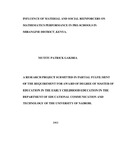| dc.contributor.author | Mutitu, Patrick G. | |
| dc.date.accessioned | 2012-11-28T12:27:24Z | |
| dc.date.available | 2012-11-28T12:27:24Z | |
| dc.date.issued | 2012 | |
| dc.identifier.uri | http://erepository.uonbi.ac.ke:8080/xmlui/handle/123456789/7094 | |
| dc.description.abstract | The purpose of this study was to investigate influence of material and social reinforcers on mathematics performance in preschools in Mirangine district. Four research questions were formulated to guide the study. These included the influence of application of either material or social reinforcers on mathematics performance, the influence of material reinforcers or social reinforcers on retention of mathematical concepts and finally the effect of participation on the type reinforcement applied to motivate learners in mathematics.
The study was quasi experimental design with experimental and control groups. The samples for the study were selected from the 34 preschool in the district through cluster and simple random sampling techniques. This gave every preschool in each cluster equal opportunity of being selected. There were two preschools each in either control or experimental groups and their teachers. Study instruments included written and oral pretests, post-tests, questionnaires and observation schedules. The study instruments were pilot tested in two preschools which were not used in the final study.
The study revealed that children motivated using social reinforcers performed relatively the same in mathematics as those motivated by accompanying social reinforcers with material reinforcers. It was also established that there was retention of mathematical concepts in both experimental and control groups with equal measures of non-retention depending on the subject matter.
The study also established that the level of active participation in mathematics was sustained through - out the period with the application of social reinforcers. Children in the experimental group(where social reinforcers accompanied by material reinforcers) were quite active in participation in the first two weeks. This trend diminished to replicate the pre-test findings by the fourth week. The study hence concluded that there is no much difference in mathematics performance whether the child is motivated using social reinforcers or accompanying social reinforcers with material reinforcers.
The study further established that retention of mathematical concepts is not influenced by the type of reinforcer applied. The study noted that although accompanying social reinforcers with material reinforcers could enhance active participation, there would be no need for the material reinforcers if the sole objective is to improve mathematic performance.
Based on the findings it was recommended that teachers should diversify their methods of motivating children particularly the slow learners. Ability grouping could play major role in improving mathematics performance in preschools. Based on the findings the study suggested that there is need to research on methods of motivating young slow learners in preschools. Further there is need to research on relationship between the level of participation and eventual mathematics performance in preschools. | en_US |
| dc.language.iso | en_US | en_US |
| dc.publisher | University of Nairobi, Kenya | en_US |
| dc.title | Influence of material and social reinforcers on mathematics performance in pre-schools in Mirangine District, Kenya | en_US |
| dc.title.alternative | Thesis (MED) | en_US |
| dc.type | Thesis | en_US |

